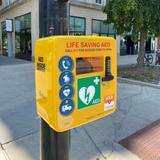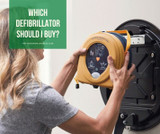How many lives are saved by defibrillators in the UK?
What is a defibrillator?
A defibrillator is an advanced medical tool that delivers a high energy, electric shock to the heart through the chest wall. It is essential for those suffering a sudden cardiac arrest and can mean the difference between life and death. You can find defibrillators installed in public parks, workplaces, high streets and sporting venues. Wherever a defibrillator is located in a public area, they are known as PADs - public access defibrillators.
A defibrillator is its most effective when administered within the first minute of someone collapsing. If used within the first minute, the survival rate can be as high as 90%. If however, a defibrillator is used within the first 3 to 5 minutes, the likelihood of survival drops by 16%, showing that having a defibrillator close by makes a huge difference.
What is a sudden cardiac arrest?
A sudden cardiac arrest can happen to anyone at any time. They can happen to anyone regardless of age, gender or ethnicity. This mean children or adults, males or females or anyone of any ethnicity can be affected. A cardiac arrest occurs when there is an electrical fault with the heart which causes it to stop. A stopped heart results in a lack of oxygenated blood being pumped to the brain meaning victims will likely die unless a defibrillator is used straight away.
How many people suffer from cardiac arrests?
Deemed a ‘healthcare crisis’, there are around 60,000 out of hospital cardiac arrests that occur every year in the UK, according to European data. In 2019 alone, there was a a huge 7.4 million people living with heart and circulatory diseases alone. An increase in defibrillators across the country has thankfully meant more lives are being saved.
According to the British Heart Foundation, less than 1 in 10 people survive a sudden cardiac arrest. Unfortunately, only 3% of defibrillators are used outside of hospitals and only 40% of bystanders who witness a cardiac arrest would be confident in performing CPR. With this in mind, the more people that are taught about the importance of CPR and how to deliver it would increase this 40% figure drastically. This in turn would save more lives.
The national defibrillator database that was rolled out by the NHS clearly shows that the more people who know about defibrillators and how to use them, undoubtedly increases the number of lives saved. Last year, an average of 460 people a day died due to heart and circulatory problems - that’s 170,000 people a year. Since the British Heart Foundation has been established though, this number is thankfully half of it’s original statistic.
Risk factors
Although cardiac arrests can happen to anyone, there are a number of risk factors that can increase your likelihood of experience a cardiac arrest. Previous heart conditions such as coronary artery disease can increase your chances of experiencing a cardiac arrest. Other risk factors include; stress, illegal drug use, high blood pressure and hereditary heart conditions such as a coronary artery anomaly.
Carrying out a healthy lifestyle is the best say to avoid a sudden cardiac arrest happening (although it is important to remember that they can happen to anyone). Avoid too much alcohol, stop smoking if you do, try exercising more regularly and eat a balanced diet. Of course, if you suffer from a coronary condition you may be more of a high risk factor but, adopting a healthy lifestyle increases your likelihood of having a stronger, healthier heart.
Response times across the UK
National statistics show that the average response time for ambulance services in England were 7 minutes and 19 seconds in February 2020. Data also shows that the average call answer time was 5 seconds meaning you can get through to the emergency services almost instantaneously. You should still always remember to always call an ambulance in the first instance however as seven minutes without care could mean a life is lost.
The survival rate for someone suffering a sudden cardiac arrest decreases by 10% every minute. Using a defibrillator whilst you wait for the emergency services to arrive will more than likely save a life.
Research also shows that those who suffered an out of hospital cardiac arrest had a survival rate of 56%. Using a defibrillator and delivering CPR straight away could help increase this figure even more.
What to do in an emergency
If somebody you are with or a passer by suffers a cardiac arrest, they will lose consciousness straight away and their heart will stop beating. To help them, first call 999 and begin CPR. It’s important to remember that in order that you must use a defibrillator in order to save their life. Once you have called the emergency services, find your nearest defibrillator and begin using it. All defibrillators are easy to follow and have simple guides that show what steps should be taken to correctly use the defibrillator.
Thankfully, defibrillators allow everyday members of the public to become life savers when it is most unexpected. Although the chances of having to ever administer CPR or use a defibrillator are low, having those resources and skills in place is invaluable. With the national database of defibrillators being launched in Spring 2019, the more people who know about them, the better.
With such advanced technology defibrillators work cleverly to ‘shock’ a persons heart into restarting after suffering a cardiac arrest and can be done within a few minutes of use meaning. Often a victim can make a full recovery. At the moment there are over 10,000 defibrillators in the UK with maps helping to identify the nearest one to your work place or local town with hopefully many more appearing in public places before long.
Recent Posts
-
Empowering Communities: The Lifesaving Impact of CPR on Restart a Heart Day
Every year, on and around October 16th, an important event takes place - Restart a Heart Day. This a …16th Oct 2023 -
Which home defibrillator?
80% of all out of hospital cardiac arrests occur at home. Defibrillators are often available in loca …4th Dec 2022 -
Which defibrillator should I buy?
There are many defibrillators available on the market and it can become overwhelming knowing which o …4th Nov 2022




